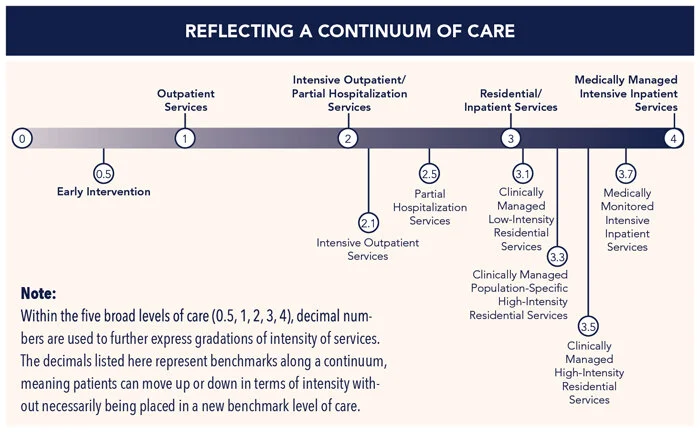Addiction Treatment:levels of care
Two weeks ago, we discussed the types of addiction treatment available (click here for that discussion), and last week we took a deeper dive into the factors to consider when evaluating the level of care needed to appropriately manage and treat addiction and substance abuse disorder concerns (click here for that discussion). This week we will round out our 3 part series by looking at the continuum of care for treatment options that exist and appropriate determinations of what type of treatment may be best for the individual. As previously mentioned, this information is meant to guide, educate and inform. It is always in the best interest of anyone who is struggling with addiction and substance abuse concerns to meet with a trained mental health provider and addiction therapist to address the best treatment for their individual addiction treatment needs.
The American Society of Addiction Medicine (ASAM) organizes the various options available for addiction treatment in what they refer to as a continuum of care. This model offers a format for understanding the levels of addiction and intervention and treatment based off of a 0 to 4 point scaling system. Further information on the AMAM levels of care can be accessed here.
(Image provided by ASAM)
Levels of Care:
0.5 Early Intervention
These types of outpatient services assist in managing substance use or addictive behaviour for those at risk of developing substance use disorders. At this stage in intervention, addiction therapists and mental health professionals work to assist individuals in building coping skills, behavioral changes and addressing underlying anxiety, depression, trauma, PTSD or mood dysregulation that may push an individual towards substance use.
1 Outpatient services
Outpatient services are addiction therapy interventions that are less than 9 hours per week, and in most cases are week to bi weekly addition therapy aimed at stabilizing addiction use, maintaining sobriety, and addressing factors influencing long term addiction management. These types of services are best for those with some level of control over urges and substance use, and not in need of detoxification treatment.
2. Intensive Outpatient or Partial hospitalization
2.1 . Intensive Outpatient
2.5 Partial hospitalization
These programs range from 9 to 30 plus hours per week of outpatient addiction treatment. The programs often help clients who are newly sober or substance free and are learning the skills of sober living. These programs often include both individual addiction therapy as well as group therapy and may also address co-occurring mental health concerns like anxiety, depression, trauma, or mood dysregulation. These programs may be used as a step down from higher levels of care or independently. These programs are best for those who are struggling with urges and managing day to day life without the use of substances, but are not indeed or medical oversight for detoxification.
3. Residential or inpatient services
3.1- 3.5 Clinically managed services with varying levels of intensity
3.7 Medically monitored intensive inpatient services
Residential in patient programs are 24 hour service programs that range in time from a few days to 90 plus days. These programs are best for those who are unable to maintain sobriety or manage substance abuse in their current environment. These programs vary based on the level of medical intervention required to stabilize and support the client in the beginning stages of their addiction treatment journey. Higher levels of medical intervention are most appropriate for those experiencing physical symptoms of withdrawal.
4 Medically managed intensive inpatient services-
This is the highest level with significant elements of medical oversight and medical care accompanying addiction counseling and mental health treatment. These types of care programs are often best for those that are at risk for severe withdrawal symptoms, have levels of medical fragility, or have other physical health concerns requiring medical care while addressing addiction recovery needs.
If you are in need of immediate assistance the Substance Abuse and Mental health Services Administration hotline is available for support. Click here to access crisis resources.
For additional information on treatment centers in your state, click here for a resource directory.
If you believe that outpatient services are right for you, we are ready to help you take the step in your addiction recovery journey. We offer online therapy for addiction counseling for Texas residents, and in person services for DFW, Fort Worth, Dallas, Arlington, Mansfield and Grand Prairie residents in our Arlington based counseling office. Our team is trained to work with co-occurring trauma and offer EMDR therapy and even spanish services to meet your needs.


